#its full of dramatic irony <3 its so silly <3
Text

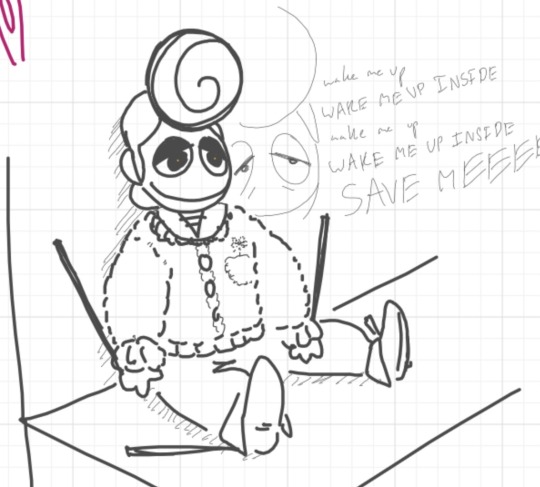
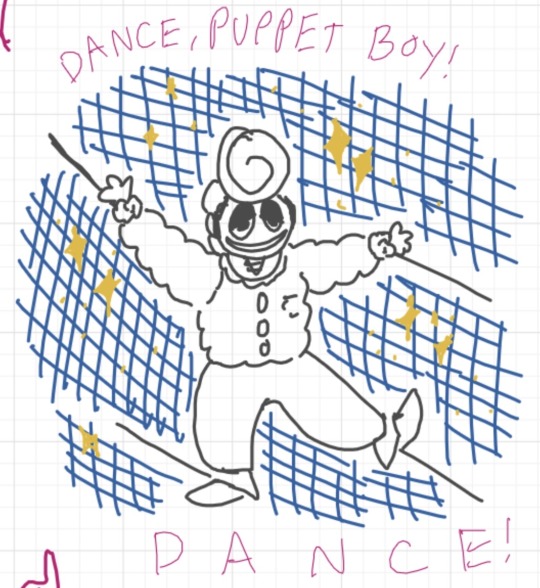

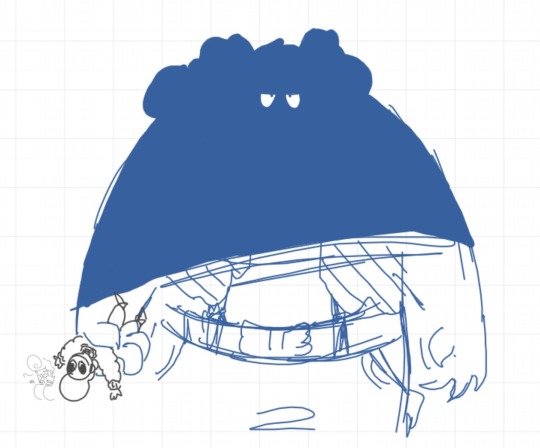
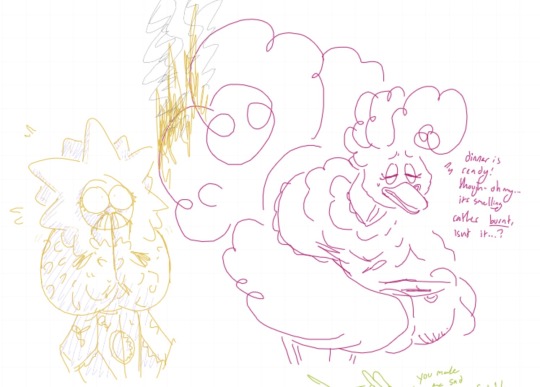
fantasy au whiteboard scribbles <3
#the brainrot has been. SO severe lately you guys dont even Know#its insanely funny to me picturing sally accidentally setting things on fire#She's Simply 1) Made Of Fire & 2) Made Of Fire#poppy's poor tail... sally absolutely tells her that she put it over the campfire when she turned around#ohhhh a Thought... writing it down for future use#another thing that entertains me is the 'wally reverted into puppet form' arc#its full of dramatic irony <3 its so silly <3#scribble salad#wh fantasy au#OH THIS WAS FROM WHITEBOARDING WITH MIGUEL AGAIN! INDIGOPOPTART! GO LOOK AT THAT BLOG RN!#but. yk. a 'trope' in art that i absolutely Adore#is when character's faces / upper torso is blacked out in shadow bc they're just That fucking incensed / Experiencing Emotion#ITS CATNIP TO ME!!!!
323 notes
·
View notes
Note
what do you think is the happiest/most light-hearted episode of hannibal?
God this is a tough one... happiness in Hannibal is a distorted thing; either the presence of happiness (or contentedness) exists in a sphere of dramatic irony, or has a doomed quality to it, where we as the audience know that what exists between them is going to quickly be taken away, or it’s mutilated by what we know of the characters. Especially in a rewatchーlike how Beverly being Will’s defender goes from heart-warming in the first watch to a slow terrifying crawl into the inevitable in every watch afterwards. Or how in Dolce Will and Hannibal’s reunion is so warm and sweet and is quickly, suddenly, ruined by themselves.
The first episode of Season 3 is probably objectively the most light-hearted as a stand-alone, because it’s just sort of Hannibal living his best life (or trying to) while Bedelia is exasperated. It begins with a sense of humour as well. It’s Hannibal but through Hannibal’s perspective. However it isn’t super light-hearted because the reason for its sole focus on Hannibal and Bedelia is because we have no idea which of our beloved characters are dead. And the absence of Will Graham is potent. But I think like, in comparison to everything else? Probably that. Others that this question made me think of:
I would say Fromage is among one of the most... not light-hearted, but sweet? Episodes of the first season. The first season is particularly hard for me to rewatchーin my experienceーbecause it’s so infused with this terrible descent into madness, the awareness of manipulation, Will being powerless yet finally opening himself up to trusting someone, and then it’s destroyed... but Fromage, while still having that manipulation in it (you can’t escape it in season one especially) is still kind of sweet and almost fun. Like it’s dark, and grotesque, and still infused with dramatic irony, but it still has like a tenderness to it, and a silliness, and its fair dose of humour.
Yakimono from second season? It’s still wounding after Beverly, and it’s incredibly unfortunate for Chilton (poor Chilton), but there are good elements to it: the return of Miriam Lass which is almost a victory for Jack, Will’s release, and Chilton going to Will for help or support does have like its humour. And Will has reclaimed a certain power; this completely changes the dynamic between Hannibal and Will. For the first time, not only does Will know what Hannibal is, but he’s also free. It is very sad for Will and Alana though.
Su-zakana is a bit grim, but it does have comedic elementsーonce you’re passed the initial horror of a first watch, the social worker in a horse thing is immediately funny as hellーand it does have a lot of intrigue, and there’s nothing doomed yet about them. Everyone is sort of... on good terms again. And it’s very fun dynamics.
If anybody else has thoughts on what they consider to be among the most light-hearted or happy episodes please share! I wanna see what people think. There’s probably eps I’m missing haha, it’s been a while since my last full-bodied rewatch.
27 notes
·
View notes
Text
OC Interview
@wortfinder shared this with me ahead posting her’s. I just saw she finished hers and realized I didn’t tag her right.
Rules: Pick a character from your WIP, and have them answer these 15 questions, then tag 15 people.
I changed the phrasing of these questions a little so that they would have a more intimate phrasing/feel more natural for the characters to respond to.
1: I don’t think I know you’re full name?
It’s Lyall Philip Driscoll. I try to avoid any of the titles with it. Being Scottish doesn’t really transfer so well over to English gentry.
2: Is there any meaning behind that name?
I think all of it’s ironic, intentional at worse, embarrassing at best.
Lyall is Scottish, it means something roughly like ‘Wolf’s shield’ and my father was being ironic when he gave it. I don’t know how he thought his first born wouldn’t be his heir, but he always wanted other sons and he always wanted me to serve so he could have more power. Everything he asked was for me to serve to give him power ...
Philip was about one of the things we ultimately shared - A Christian name for my baptism, but a Greek one with a secular meaning, ‘Lover of horses’ or I prefer ‘Friend of horses.’ My father liked horses for the privilege and had an eye for horse flesh, always knew how to buy a good horse. I on the other hand was as mad about them as any four year girl who wants a pony every birthday and that enthusiasm only wavers when I question if whatever horse I want would really be the best fit for both of us.
Now Driscoll didn’t suit my father I mention because it’s the only name we shared, but like all the other irony, it suits me. My father never held any leaderships positions with Robert’s pack. He wasn’t interested in those responsibilities, but he thought I was right when I said Andrew Carter’s pack would make more money than Robert’s ever dreamed of. Driscoll means ‘To go between’ or roughly ‘messenger’ and that is the role I’ve played for both my pack and Andrew since I helped Andrew start the blasted mess.
3: What are your favorite nicknames or maybe something else you’re fond of being called.
I really do like that Andrew never refers to me by any of my titles. When it’s formal, I am always Mr. Driscoll to him. He measures me as a man in my own right, free of anything I haven’t earned.
4: Do you consider yourself a man, are you comfortable with that?
I was born a man, I am a man, and a man I shall always be.
5: What are your sexual preferences?
I don’t advertise my sexuality freely, but I also make little effort to hide that I am a a gay man. I can’t say I’m quiet a proud gay man, but I didn’t grow up in a time where pride in what I was seemed possible. I take pride in things I do, not things I am.
6: Where are you from?
I was born in Scotland, but my father’s interests and government ties had long brought our branch of the family to London. I was only born in Scotland so that my father wouldn’t feel so shoddy about the title he retained. Hard to be a Scottish Lord when you’re born in England. We’ve really been more English than Scottish since James took the throne. I tend to prefer living outside of London, but I’m within the city almost daily and it would be silly to think I’m anything but an Londoner.
7: How old are you?
Too old for you. I was born in 1855, and if I think about it, I’ll figure that out.
I’m one hundred and sixty four years old. My birthday was in April. Funny that I used to think I was far too young for things I wanted.
8: What is your lineage, I know you mentioned a pack, so I’d assume you’re a werewolf? Are you anything else?
I’m a werewolf, of a long line of werewolves. Like most of us, I probably have some blood from the continent, but there have been werewolves in Scotland and England for centuries at this point. We’re rare, but we’ve circled the globe by now. I do probably have some witch blood, too, but not much. Mostly some inane insight into trivial things.
9: How would you describe your appearance?
I think I’m a bit dark for a Scotsman. Especially when you look at me next to Andrew. Dark brown hair, brown eyes, tanned skin, muscles from riding, rough hands because while we might heal fast, it still takes a bit for all the rough spots from hard work to rub off. I’m about average height, 5′10, but broad around the shoulders and broader in the arms. I’m probably twice as intimidating as I’d like.
10: What’s your style?
Anything I can ride in on the average day or don’t have to worry about getting too dirty and rucked up while still looking functionally professional for my day job. When I’m not working in a professional sphere and my focus is on the pack, I tend to base my wardrobe on whatever will look least out of place and most in step with my alpha.
11: Who’s your best friend?
I have known Andrew what feels like all my life. I met him when I wasn’t quiet twenty, but we didn’t become friends til later. Sometime before I was twenty five, we were inseparable despite the age gap. I think that was mostly my fault and born out of some childish idolization, but Andrew needed a friend and I was it. We’ve had each other’s back since I suggested he leave his father’s pack. It was a good decision politically and financially, so maybe that’s part of why we’ve stayed close.
12: Would you ever get a piercing/tattoo?
I’ve considered piercings, I know some wolves who get them, but the earrings have to stay in most of the time. They class with professional fashion most of the time. I did once get an interesting piercing. It was quiet tender and hurt significantly. I took it out when it went out of fashion, but it was fun for the period. I wouldn’t do it again.
13: When are you happiest?
Probably whenever something has gone borderline horribly wrong and Andrew shows up at my door. I get to pretend I’m deeply confused and a helpless oaf covered in dogs. I always like being covered in dogs and I like Andrew exasperated and angry when it’s nothing that can’t be solved. I would do anything to solve all of his problems, but I love how hot his blood boils between the discovery of a problem and its resolution. It’s bad enough to make me consider inappropriate and counterproductive pranks, but if I started, I probably will get to greedy to stop and just end up watching him raging around his office most of the day.
14: If you could reveal something in this room without consequences, what would it be?
How sad it is to be alone. I have a robust dating life including weekly affairs, I have life long friends, people I would trust with my life. I have the respect and admiration of an alpha I am so honored to call my closest friend and a pack that respects me, though I often can’t see why they trust me so ... and I am alone.
I would live longer than any humans I were to decide to date and the pack is about fifty old white men, rather, to be fair, it isn’t. It’s men and women and children and it’s vibrant. They trust me and I love them. I would do anything to keep the pack safe and to support and protect them, even against Andrew, and yet I have what feels a rare privilege to trust my alpha utterly and completely.
I want to love and be loved and wake up each day with someone who can be second in my heart to all that responsibility, while still knowing I love them utterly and I want to be with them always. I’m tired of waking up alone.
15: What was your first impression of…?
…Ian.
He looks so much like his mother. Sarah died too young and Andrew will never recover from his role in that, but maybe Ian will bring him some peace. He and Andrew seem the same overly dramatic, messy sort who the British elite try to pretend their above, with logic and reason where mostly reason is just whatever they want most. But I also saw a danger, Ian had already killed Robert and if he made attempts towards Andrew, I needed to be there and I needed to be ready to protect Andrew. That wasn’t because I thought Ian would win a fair fight or that even if Ian cheated, he would win a dirty one, but that Andrew shouldn’t have to kill his own nephew after everything with Sarah. Need be, I would do that.
Tagging anyone who wants to as most of the blogs I follow write primarily fanfiction.
14 notes
·
View notes
Video
youtube
MARTHA - LOVE KEEPS KICKING
[6.17]
Pop-punkers kick up little more controversy than last time around...
Jonathan Bradley: Pity Me faves Martha return a bit less punk and a lot more power pop, their effervescent slapdash glee extending now to a pert swing rhythm and attempts to mosh to Huey Lewis and the News. "Love Keeps Kicking" holds its optimism in check with an almost discomfitingly earnest despair -- and vice versa: you barely notice how quick "you were tripping fractals" turns into "sometimes I feel so empty I just wanna leave it all." But there are jokes as well -- "I need a paid interpreter to decipher your midnight texts" is shade worthy of Fight Like Apes. The first time I heard it, it sounded like the kind of classic that immediately asks you to pull together playlists so that it might literally sit beside other effortless classics, like say, "Where Have All the Rude Boys Gone" and "Another Girl, Another Planet" and "Alex Chilton" and "Beat Surrender" and "The Boys are Back in Town." (It's as rousing as any of these.) But it also made me want to cue it up again and again. Martha: I am listening.
[9]
Alfred Soto: "Is that Weezer?" the dude at the other table wondered when I played the opening bars without realizing the headphones weren't plugged in.
[1]
Ryo Miyauchi: Martha mines from sweeter-than-sweet jukebox favorites, and the verses leading to the big payoff of a chorus are filled with charmingly personal specifics. Every other line makes you want to inquire more about the story. "When you got smashed and tried to mosh to Huey Lewis and the News": they could make a whole other song based on this.
[6]
Iain Mew: We're about a decade early for a song to precisely be to Belle & Sebastian's "I'm a Cuckoo" what "I'm a Cuckoo" was to "The Boys Are Back in Town", but never mind. It might be a scruffy ramble, but every time the harmonic guitar comes in it makes all the sense it needs to.
[7]
Thomas Inskeep: Martha are supposedly a four-piece punk band, but all I hear on "Love Keeps Kicking" is mewling, whiny Brit indie that makes my teeth itch and my fist clench.
[2]
Juana Giaimo: I find it easy to identify with self-deprecating songwriters -- that's probably why I love Paramore, especially in After Laughter. Martha often writes self-deprecating lyrics too, but "Love Keeps Kicking" also sounds really cheerful -- there's even an acoustic guitar strumming as the base of the song. However, there is something darker in the excess of energy. The backing vocals literally scream, and the main voice is too dramatic, as if he was pouring his heart out from desperation. This kind of irony is what makes Martha such a compelling band, able to understand the silly contradictions of love.
[8]
Alex Clifton: I suddenly understand why people love pop-punk; I would too if there were fewer whiny frontmen and way catchier melodies like the ones Martha have given us. This will be stuck in my head for the rest of the day, and I'm fine with that.
[7]
Katherine St Asaph: I love power pop, but with so much of it, you have two choices: Weezer-indebted stuff that coats your inner ears with Reddit gold, and/or great tracks with pinched voices, more like love keeps kicking the shit out of their vocal cords. Note: I'd probably love this if it were a Veruca Salt or Sarge song.
[6]
Joshua Minsoo Kim: Songs like "Love Keeps Kicking" remind you that mediocre power pop songs can make you think they're good because of a repeated, catchy guitar riff. Don't be fooled.
[3]
Tim de Reuse: Okay, okay, I'm charmed, Martha, you got me. You're not perfect, but you're loose and messy in an energetic way, and you're silly, but just the right amount of silly. I love the awkward pattern of emphasis on the stupendous line "I need a paid interpreter to decipher your midnight texts," and the whole-hearted harmonized "ooh-yeah" of the chorus, and that addictive, twangy guitar lick! The mix is a bit flimsy for my tastes, but they've laser-focused on achieving a particular high-octane atmosphere, and I can't disrespect people who are so clearly good at what they do while sounding like a bunch of goofballs.
[8]
Jacob Sujin Kuppermann: There is a certain kind of song that exudes kaleidoscopic joy, where every note is so beautifully placed that you can't help but love it. "Love Keeps Kicking" is one of those songs, dazzling in its shaggy glory. It's all jutting edges that hold in your memory, from the guitar lines down to the show-stopper of a bridge. I can't imagine getting this out of my head, and I can't imagine wanting to, either.
[9]
Vikram Joseph: When I first heard Courting Strong, Martha's debut, I was enraptured; here was this headlong torrent of empathy, nostalgia, hope and anxiety, contained inside perfect three-minute bullets of jagged pop-punk, fired directly at my hypothalamus. They had grown up and come together as a band some 15 miles from where I grew up; it felt like it was meant for me. That kind of adoration and affinity generates expectations that border on fear, but this band keep on meeting them. The chorus of "Love Keeps Kicking" almost sounds a little too simple at first, until you hear the full phrase that gives the song its name: "Love keeps kicking the shit out of me, and there's no solution I can see." And then, despite the backdrop of rollicking, indie-punk power chords, it's suddenly devastating; they've never sounded defeated like this, and it's like seeing the most upbeat person you know in tears. The big chords dropping out feels like the mask - you know, the one you wear every day at work and when you see your friends so they'd never guess that, some days, you wake up feeling utterly hopeless - slipping to the floor. "No happy pill / no drinking bleach / no permanent lobotomy," sings JC Cairns, his voice endearingly strained as usual, but for once running out of reasons to stay positive or ways to fix everything. That empathy, though, still runs through the song like an artery; the hyper-specific anecdotes in the verses are Martha's way of making the pain communal, as they always have been. Love keeps kicking the shit out of us; remembering that might make it hurt a bit less when it does.
[8]
[Read, comment and vote on The Singles Jukebox]
2 notes
·
View notes
Text
An exciting new review experience in three parts! It’s gonna be a long one!
It was only a matter of time until I addressed this elephant in the room: I’m a little bit obsessed with To All the Boys I’ve Loved Before — both the Jenny Han novel and the Netflix original movie. And I’m pretty sure I’m not the only one. To All the Boys is the story of Korean-American, high school junior Lara Jean, whose personal love letters to each of the five boys she’s loved are accidentally sent out, all while she’s dealing with the challenges of her older sister leaving for college (and leaving behind an ex boyfriend that Lara Jean has always had an eye for). In an act of mutual damage control, Lara Jean and her former crush Peter Kavinsky enact probably the best (and definitely my favorite) rom-com cliche of all time: they pretend to be a couple.
I received a copy of the book (the first in a trilogy I haven’t read the rest of yet, NO SPOILERS) as a Christmas gift last year, and I read it back around February or March. Now that the Netflix film has taken Twitter the world quite literally by storm, I figured it was time I launched my thoughts right out into the eye of it. So without further ado, here’s everything I have to say about To All the Boys I’ve Loved Before, presented in three parts.
To All the Boys I’ve Loved Before: The Movie
When I’m out of town for the night, Matt has a ritual where he gets a pizza or some snacks and watches a movie I wouldn’t like with the cat. Last week, on a night when Matt was going to be out late and my cat and I were home alone, I decided to do the exact same thing myself (except now I’m pretty sure that he would actually enjoy this movie too). Actually, there are a lot of reasons why this movie is good for EVERYONE, even us “grown ups.” I was feeling a little down on that particular day, and I needed something lighthearted and a little bit indulgent to get my mind off of it, so I put on To All the Boys, because even though I knew I wanted to watch it, I’d been putting it off, in a way.
While some nights since its premier I just didn’t have the time to sit and watch a whole movie, hype scares me away from things. Not in a hipster sense of “If too many people like it, then it must not be good,” but I fear the bandwagon effect. I don’t want to like it just because other people do and I want to fit in. But I have nothing against liking something popular if I actually connect with it. With this movie, I was actually expecting it to be a little cliche, a little cheesy, and a little silly, but in all actuality, it’s just the best rom-com I’ve seen in a really long time. Seriously.
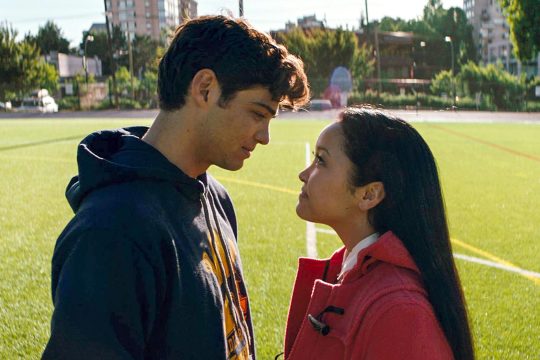
The casting, the characterization, and the pacing all impressed me in their own ways, but what actually stood out to me about the movie was the cinematography and the storytelling choices. I’m not pretending to know anything about movies, but this could have easily been a movie that focused on the plot to give the people what they want: ROMANCE. While that’s still the main focus, the creative direction of the movie really surprised me with the handling of all the side conflicts circling around the main arc. Visually, it was way more interesting than you’d expect from a rom-com: the shots are interesting, and a little bit conceptual, and all meant to capture Lara Jean’s state of mind, not just what she’s doing or what she looks like.
I also give the movie huge props for something a lot of teen movies weirdly fail at, which is writing dialogue that actually sounds the way teens talk. There was no awkward slang, no overly-rehearsed sounding monologues, and even Kitty sounds appropriately mature for her age without going overboard. Even with it’s modern inclusion of social media, To All the Boys actually nailed it in the dialogue department.
I’ve only got one real bone to pick with the writing overall, and that’s the scene in the first act of the movie that, in my opinion, pretty obviously gives away the twist at the end. I read the book; I knew what happened already. But for someone that didn’t, I think they showed their hand too early. (Notice how I’m speaking in generalities to avoid spoilers). The reveal wasn’t explicitly stated, but I think it was too heavily implied. What Kitty says on the couch is enough. If there was a way that the dramatic irony of us knowing the secret that Lara Jean doesn’t could have enhanced the movie, I would have been all for it, but I don’t think they pulled that off. But this is still a small enough gripe not to ruin the movie for me.
And one more thing: the movie didn’t treat really any character as merely an expendable plot device. Lara Jean is and incredibly well-developed protagonist who I came to love almost immediately (how couldn’t I when she daydreams in regency-era period dress?). But the important thing is that we never stop learning about her; not all the information is dumped into exposition, we have to earn our full understanding piece by piece. While I did feel that Gen was reduced a little bit to the “mean girl” stereotype, we do eventually find out why she acts the way she does, and it’s actually a game changer, if only subtly. (Actually, it’s my opinion that the movie needed more Chris, too.)
This is also part of what makes Peter K. such a great character in his own right, not just as “the love interest.” What’s refreshing about Peter is that he’s a softer form of masculine lead that we don’t see too often, but the kicker is that he’s not afraid to show it from the very start (and to be honest, I didn’t get this as strongly from Book Peter). No “tough guy” layers to dig through—his heart’s pretty much on his sleeve, even though he’s still the cool guy all at the same time. Plus, Noah Centineo is a dreamboat (we were all thinking it). I’m telling you, he’s going to be the Chad Michael Murray of his time.
This is unfair and their outfits match.
While of course there wasn’t time for book-length dives into every character, even Lara Jean herself, the characters were portrayed in a way that encourages the audience to make a connection.
https://twitter.com/ivyjune12/status/1037885481302847488
I’m a firm believer that a movie is not a book. Obvious, but what I mean is that a movie doesn’t just have to be a direct retelling of the book in exact detail. In my opinion, if that’s all a movie does, it was unnecessary. I did all that in my head already. What I think makes a great movie adaptation is that it has to have something to say, some interpretation of the characters, plot, and themes, while still capturing the overall idea and spirit of the book from whence it came. I understand the cuts that were made for the sake of real-estate (though I’m hoping a certain deleted kiss surfaces in the sequel I’m praying for). What they did was tailor down the story to make it more self-contained, more refined, and more to the point so that it fit the medium and told they story it needed to tell while really letting us live inside Lara Jean’s head for a while.
But also, how much do you think Subway paid for that product placement?
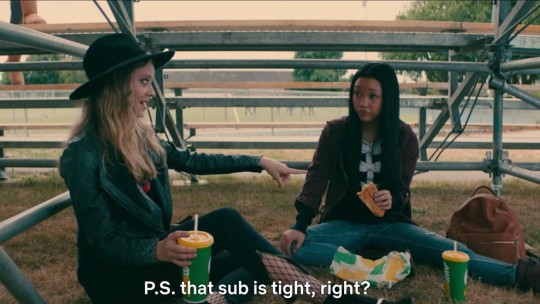
To All the Boys I’ve Loved Before: The Book
You’ll have to excuse my copy of the book, for it has the leftover residue of a “soon to be a major motion picture” sticker that didn’t quite come off all the way. Switching gears, To All the Boys I’ve Loved Before by Jenny Han is just about everything you want in a YA read: a quirky, relatable (and diverse!) main character, a pseudo-love triangle with ~nuance~, and a family secret or two threatening to fracture some relationships when it erupts. I’d known about the book for a few years (thanks, Tumblr), and I made pretty short work of it once I actually had a copy in my hands. The romance arcs made it a page turner in a lot of ways, with the way they criss-crossed and changed shape and came to a heated point.
That being said, I found the book itself a little slow in places in terms of pacing. It’s on the longer end of the YA spectrum, and while I can’t say I ever lost interest, I got a twinge every now and then when I finished a chapter without learning anything new, per se.
My other issue had much ado about Margot, Lara Jean’s older sister, who, despite not being present for the majority of the story, never truly leaves us. I completely understand why Lara Jean thinks of Margot often: she misses her sister, is distressed about keeping the secret, and worries that she’s not ready to fill Margot’s shoes as a caretaker. But in the book, Lara Jean is so preoccupied with Margot that I have to admit that there were moments I was sick of hearing about her.
What I loved most about the books was that Lara Jean’s romance was surrounded by several subplots dealing with friends, family, responsibility, family, and growing up. While a movie only has so much time before it loses us to sleep or boredom, a book can go on, night after night, expanding the main character’s world that we’re lucky enough to be living in. In the book, we get to see a lot more of what Lara Jean’s mom, and her Korean culture, means to her. We also get to see a lot more of how her family has grown from the past until now, and how they’ve all taken on changes before and after Margot’s departure. And maybe the thing I was the most heartbroken about was the letter in Margot’s desk and all the implications it held. Lara Jean wasn’t the only one with a secret, and I love the complexity it added to the sisters’ relationship.
https://twitter.com/ivyjune12/status/1037856493410897920
If you’re wondering about that Tweet, I was quickly disappointed and then overcame it.

Moving on, I’d be so interested to see what more movies would do with the material we have, because there’s a choice to be made at this point: do they go back and pick up the conflicts they didn’t have time for the first time around, or do they move on to whatever new ideas are hidden inside books 2-3? No matter what happens, sequel or not, the movie has actually really nudged me towards picking up the rest of the series—something I wasn’t totally convinced (Peter Convince-sky? No, but A for effort) I’d do before.
2 Outfits Inspired by Lara Jean Covey
I saved this little bonus section for last, mostly just to amuse myself. It was impossible not to notice how amazing Lara Jean’s style was in the movie; every outfit was a SENSATION and I haven’t stopped thinking about a single one. So, for giggles, I dug around in my closet and came up with the two closest Lara Jean outfits I own.
https://twitter.com/gicatam/status/1035720646196510720
1. Skirts and Stripes
A tried and true Lara Jean combo, a button front skirt paired with a cute (often striped) top can be found during a few scenes in the movie, but I would say I came closest to the airport outfit. While my color scheme is off, the spirit is there: I even braided my hair as much as possible. Fun fact: I am a cartoon character who owns this shirt in two different colors, and these boots are old enough that I can ~almost~ call them vintage (not really).
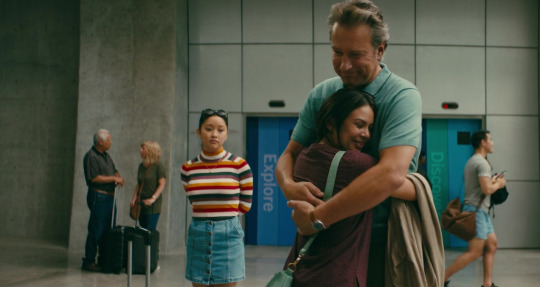
2. The Pink Power Suit
All right, it’s not a suit, but the soft pink blazer paired with skinny black jeans and a black choker was almost certainly a confidence move for the first ride in Peter’s Jeep. I don’t wear this pink blazer enough, and I wasn’t sure if I’d love it with this outfit because it’s more of a salmon than a blush (I want to introduce my best friend Squidward to everybody in town wearing a salmon suit). Actually, this combo worked out surprisingly well, minus the fact that I’m wearing a literal shoe string as a choker.
Actually, I’ve left the house wearing it like that before, and I love it. Fight me.
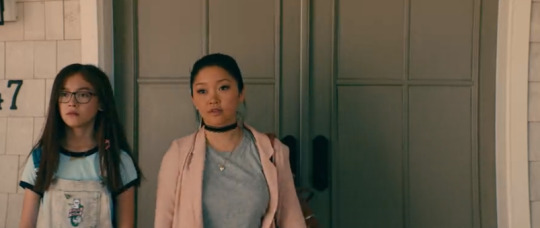
^This is the best image I could find of this outfit and I’m bummed about it.
Lara Jean’s style is the perfect combination of vintage revival and current trends, which is really everything I want to be in my life. I’m already making my list of things I need to add to my own closet: a yellow beret, a lot more bomber jackets, a gorgeous red ballgown. Maybe by the end of autumn, I’ll have the full collection. From now on, every time I go shopping, I’m doing so with the motto: “What would Lara Jean wear?”
If you made it to the end of this post, I salute you. Know of any other books/movies with outfits I should try and copy?
To All the Boys I’ve Loved Before: Movie, Book, and 2 Lara Jean Outfits An exciting new review experience in three parts! It's gonna be a long one! It was only a matter of time until I addressed this elephant in the room: I'm a little bit obsessed with…
2 notes
·
View notes
Text
Episode 5 Review: In Which the Horror Begins (+ A Lesson on Irony)
{ YouTube: 1 | 2 | 3 | 4 }
{ Synopses: Debby Graham | Bryan Gruszka }
{ Screencaps }
We have reached the end of the first week of Strange Paradise and the real beginning of the fun. I hoped to get to this post a week or two earlier, but I kept having to postpone writing entries for this blog because life kept getting in the way. I’ve also been re-watching episodes from later in the Maljardin arc, because I actually re-watch, screencap, and write commentary on each episode twice before I review.
In the last episode, THE DEVIL JACQUES ELOI DES MONDES, while possessing his descendant Jean Paul Desmond, brought Jean Paul’s sister-in-law Dr. Alison Carr to his private island Maljardin. (I find it amusing how these soaps introduce almost everyone with their full names each episode and include so much exposition about earlier events. I know that it was necessary at the time because most soap opera episodes only aired once and DVRs weren’t invented yet, but it still sounds silly.) In this episode, Alison discovers to her horror what we the audience already know: that her sister Erica is dead and sealed in the cryonics capsule.
The first half of this episode and the way it is written is a good example of dramatic irony. Nowadays, the concept of irony is often misunderstood because of the way certain hipsters in recent years have abused the word, to the extent that few people now know what it really means. The term “irony” actually refers to several distinct devices used in fiction, rhetoric, etc. which all involve a difference between the appearance of or one’s expectations for a situation and the reality:
There’s verbal irony, when someone says the opposite of what they mean: for instance, if Raxl were to sarcastically call Jacques an angel or I were to say that this show is as subtle as a neon pink sledgehammer to the skull.
There’s situational irony, when something goes differently to what we the audience expect: say, Jacques signing his name instead of Jean Paul’s on Dan’s documents while impersonating him, or no one but Raxl and Quito knowing about the temple despite its incredibly obvious “hidden” door. (Had it ever happened, Raxl calling Jacques an angel would also qualify, because she is always so upfront about how she feels about him.)
There’s historical irony, when history turns out to be the opposite of what one predicts: take this early ad for the show that boasts, “Don’t laugh. Wait until you see the ratings.”
There’s cosmic irony, when a character’s fate turns out the opposite to their expectations. This is what happens to the protagonists in the majority of deal-with-the-Devil stories, who are manipulated into signing pacts for things like unlimited wealth or magical knowledge and who trick themselves into thinking that their good fortune will last forever, but who end up damned to Hell when the Devil comes to collect their souls.
There’s Socratic irony, which means feigning ignorance to trick an enemy. This is Jacques’ usual modus operandi when someone tries to unmask him.
There’s romantic irony or metafiction, which is not present in this show at all. Strange Paradise is not meta; it takes itself too seriously.
And then there’s dramatic irony, which applies to the plot of the first half of this episode. Dramatic irony is when we the audience know something that a character does not, but which will influence their ultimate fate.
Alison came to the island to visit Erica, to ensure that she was alive and well. Jacques disguised as Jean Paul convinced her that Erica was OK and then repeatedly changed the subject and took her on a tour of Maljardin to distract her. Thinking that she must be somewhere upstairs, Alison starts to climb the steps and says, “I’m going to see her. Where is she?”
“She’s not upstairs,” Jacques replies, making Bissits Face™ as a mike shadow passes along the wall. “She’s”--dramatic pause--”below. In the family crypt.”
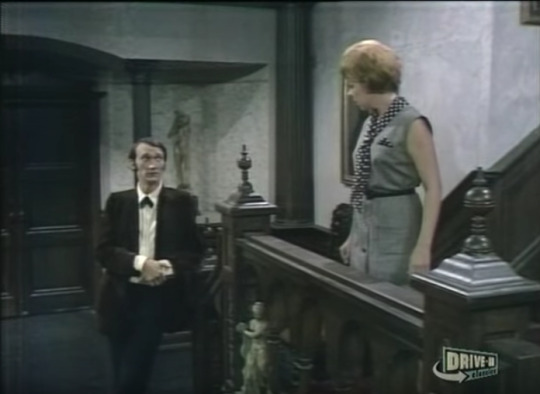
He looks so sincere. Not.
At first, Alison does not understand and laughs. “What on Earth is she doing in the-” she asks, but then it hits her. Then she realizes that he means that her sister is dead. “No, no, she’s not!” she cries.

“Only temporarily,” says the handsome devil.
“What kind of a man are you? Take me to her!”
He gives her directions to the crypt and then de-possesses Jean Paul, who blacked out while he was possessed and is therefore confused about what is going on. Alison calls for him and he joins her in the crypt. This is Part Two of the big reveal of the ironic twist to Alison, when she discovers the Cryonics Capsule. “You didn’t! You couldn’t!” she screams, thinking that her brother-in-law has frozen Erica alive.

"I love her too much to just allow her to die,” Jean Paul replies, but that does not reassure her. She accuses him of freezing her alive, but he denies it and reassures her that she was already dead. She starts crying and we get the first of many scenes throughout the Maljardin arc where these characters display affection for one another. And with that come even more feels.

Jean Paul/Alison is my OTP.
Jean Paul confesses that he no longer has complete control over himself. “I don't know what I believe, what I accept these strange days,” he says. “Sometimes I don't even realize what I am doing. Something drives me on, some power stronger than me. Some…evil force.” Cut to Jacques’ coffin in the crypt followed by his portrait, because this show’s directors don’t know the meaning of subtlety. “Raxl claims it’s the devil.”
Following this, we get some background information, first from Jean Paul about Erica’s death and then from Raxl about Jacques. I will probably end up referencing the former again in later posts, so I will quote it:
Erica hadn't been feeling well, so Dr. Menkin took some blood samples to the Mainland for tests. She was sitting on that couch just as you are now, when the first attack came. It was devastating. I have never known such fear. Dr. Menkin called it an eclamptic convulsion...Well, I got her up to her room and put her to bed. Dr. Menkin took over but there was very little he could do to ease her suffering...We lost [the baby]. But I couldn't care in that moment. About an hour later, when I was holding her in my arms, she cried out, "no, Jean Paul, no, don't let me go.” Her body felt like a steel spring under compression. It felt like it was almost ready to explode. When the spasm hit her, she arched. There was nothing I could do. Nothing!...All that beauty, all that life. My life, snuffed out as easily as a candle. How I loved her. How I still love her. My darling Erica, gone.
The latter is longer and contains some tangents, so I will summarize. That evening, Raxl reveals that, after Jacques’ wife gave birth to his son, he murdered her. Raxl and some unspecified others (she says “we”) avenged the death of Madame des Mondes by making the Conjure Doll and piercing its head with the silver pin, which she says “destroys all hope for salvation.” Then she tells Alison about how Jean Paul set him free and that Jacques possesses him. Alison refuses to believe her, saying that such things don’t happen “in this day and age.” That she doesn’t believe Raxl creates more dramatic irony, because, in case you haven’t already figured it out, Raxl and possibly Quito are the only good characters so far who understand what is going on. But Quito is mute and a zombie--meaning that he can’t say what he knows--and almost no one believes Raxl.

She is probably thinking something like, “Oh, Dr. Carr, you sweet summer child.”
Then they hear a scream outside and open the front door. Because this show had neither the time nor the budget to film more outdoor scenes, they stay in the Great Hall and watch as Quito carries the corpse of an old man inside.
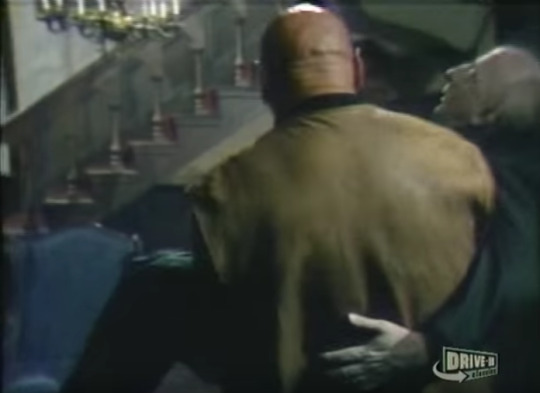

Hmmm...I wonder who did it? Do you think there’s a slight chance it may have been that smirking man right there?
Raxl identifies the dead man immediately as Dr. Menkin, and rightly suspects Jacques. He, of course, feigns innocence, complete with more Bissits Face™ and barely disguised smirking, because apparently he thinks Raxl is stupid enough to fall for that. Here is his alibi, which is thoroughly unconvincing:
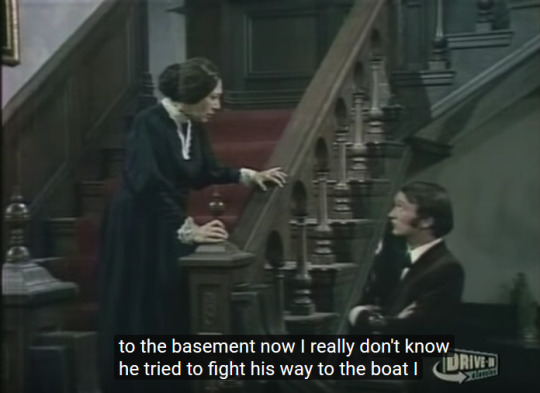

But she sees through this, because Dr. Menkin doesn’t drink, and gives him the lie. He makes her swear to keep his implied murder a secret, then orders her to leave. And then Jacques de-possesses Jean Paul, but not before plying him with booze.

I said back in my first review that this would become a common theme.
He has a fever dream that consists of Raxl shouting at him while making some seriously frightening facial expressions. Had I watched this as a kid, the faces she makes in this dream sequence would have given me nightmares.
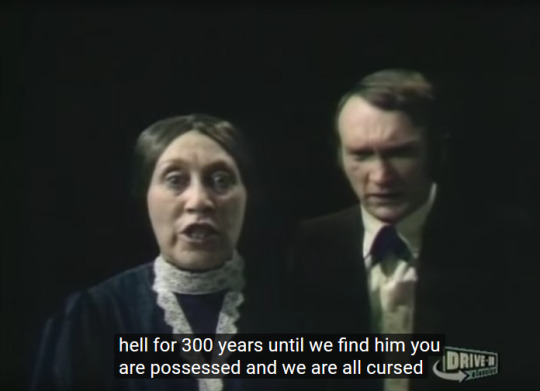
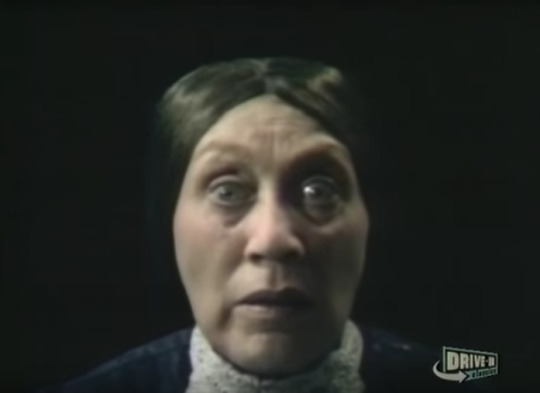
Raxl: "Don't look! Otherwise, you may see the very man you are…the very man you might have been!"
This line--a paraphrase of one from the first episode--implies that Jean Paul and Jacques are reincarnations of the same person. If this is indeed the case, does Raxl know? Is that one of the messages she intends to communicate to her master in this bizarre sequence? That Jacques and Jean Paul are the same character is something that Ian Martin implies repeatedly but never confirms, and one of many plot points that later writers forget to explore or explain. I’m not one hundred percent certain he was planning to reveal that (I don’t have access to his notes or original outline), but it seems likely.
Anyway, Jean Paul, who does not yet know of Dr. Menkin’s death, wakes up and confronts Jacques’ portrait. He, too, has begun to see the reality and cosmic irony of his situation: that, by setting Jacques free, he may have condemned himself to eternal suffering:

Jean Paul: "You are the nightmare! Must I restore your evil life to have my darling Erica's life back? Damn you!"
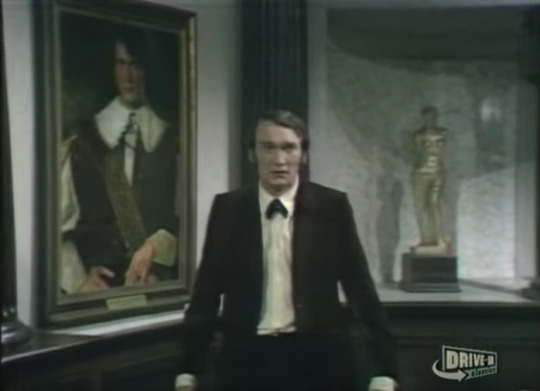
“Or am I the one that’s damned? Must I be lost in Hell with you!”
This episode is the first episode of Strange Paradise to successfully invoke the feelings of terror that one expects from a horror show. Although I love this program, I have to admit that, when they try to make it scary, they often fail and end up making it unintentionally funny instead. They tried before in the pilot in the scene where Jean Paul announces “on this island...I am God,” but the drum-roll, dramatic music, and Fox and Lee’s overacting make it instead laugh-out-loud funny. Likewise, the suspense of the scene where he frees Jacques is ruined by ridiculous screechy sound effects and intersplicing with a bad cover of a jazz standard. I think that the Jacques scenes in Episodes 2 and 4 were intended to be funny and, if so, they succeeded. While Episode 3 is scary, it’s a different kind of scary than the classic horror sense, being about two powerful authority figures trying to prey on a helpless young woman: still a common theme in the Gothic genre, yes, but not what most people watch spook-shows for. No, Episode 5 is genuinely frightening and compelling in its Gothic horror, making it a good conclusion to the first week of this soap opera.

Stay tuned for a Bad Subtitles Special on Friday and join us again next week as we review Episode 6, including a detailed recap and analysis (with a side of bad costume roast) of the second flashback about the life of Jacques. I look forward to it, and I hope you do, too.
( <-- Previous: Episode 4 || Next: Episode 6, Part I --> }
#strange paradise#gothic soap opera#week 1#episode 5#maljardin arc#ian martin#review#analysis#cryonics capsule#bissits face#genuinely scary episodes#irony#jacques making jean paul drink#jean paul/alison#non flashback dream sequence#on this island i am god#raxl knows best
0 notes
Text
Episode 55*: Shirt Club
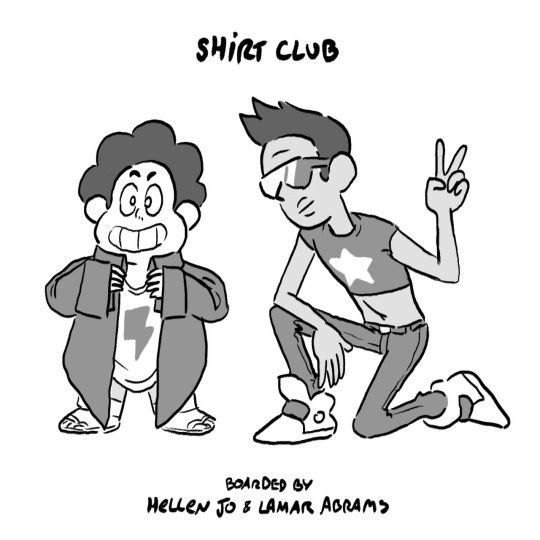
“This sounds like a very abstract problem.”
For fear of echoing Buck Dewey’s condescending assessment of Steven’s drawing, there’s just something endearing about a cartoon about making art. Animation as a medium is remarkable for how many types of artists are involved: for instance, Steven Universe exists as a collaboration between visual artists, writers, songwriters, actors, singers, composers, and instrumental musicians. It’s a crew that by necessity has a passion for art in many forms, and episodes like Shirt Club let this passion shine. (See also: James Baxter the Horse from Steven Universe’s big brother Adventure Time.)
Many of the artists behind Steven Universe have multiple roles: most famously, its storyboarders are also its scriptwriters. Some boarders even pull triple duty, like guitarist Jeff Liu and voice actor Lamar Abrams, who brings Buck to life. It’s fitting, then, that Shirt Club revolves around guitars and Buck as Steven navigates his way through the perils of publishing his art.
As sincere as this episode is, it’s also ridiculous. The final sequence of Steven as a faux assassin straight up shooting Mayor Dewey in the chest is absurd both as a situation within the show and as something that was allowed to be on the show itself, but sure enough, Steven Universe manages to give a lone gunman sniping spree an emotionally fulfilling resolution.
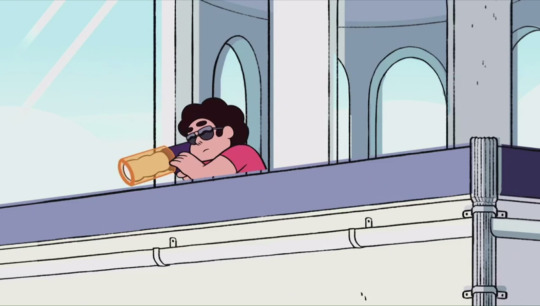
This scene proves a core lesson of the episode: just because something’s silly doesn’t mean it’s not art. Buck hits the nail on the head when praising Steven’s drawing for its sincerity and naïveté, even if he’s being a wad about it: the Guitar Dad shirt is awesome because it’s a pure expression of a kid looking up to a parent, even if that expression won’t win any medals for aesthetics (and because it won’t). Steven Universe doesn’t need to prove its artistic merits, and the episode is wise to avoid this path and devolving into meta defensiveness, but I appreciate how its structure demonstrates its message.
That Buck recognizes Guitar Dad’s merits but sees its meaning in a negative light speaks volumes about his own relationship with his father, as well as the general adolescent obsession with irony. And let’s face it, Buck is mean in this episode. The other teenagers laugh at the shirt, but don’t necessarily laugh at the subject: Sour Cream is a bit of a jerk to Greg, but Jenny seems to honestly appreciate him even if she thinks he’s funny. Lars is easily swayed, having no opinion on the shirt but seeing the value in at least pretending to appreciate it (which certainly lumps him in with real-life folks who feign an appreciation for art for impress people, if you’ll allow me an overanalysis). But Buck is cruel in a way that’s uncomfortable, but not totally out of character.
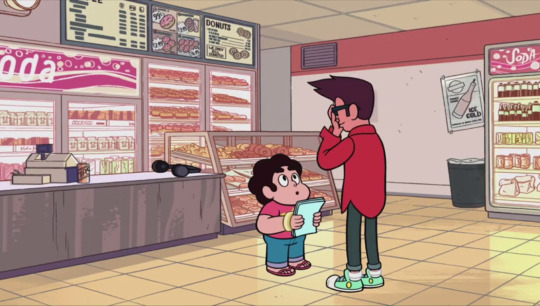
In Lars and the Cool Kids, Buck is the most enigmatic of the Cool Kids, as per his mirroring of Garnet. As he repeatedly pulls the rug out from under Lars with a straight face, it’s hard to tell how much he’s intentionally messing with the guy. The same goes for his ordering salad at the Big Donut after examining its salad-free displays. He plays it so cool in both situations (and in general) that some of it has to be an act, and he’s perceptive enough that he has to notice Lars’s barefaced need to please, but he’s such a closed book that we can’t get a read on what’s in his head.
We see more of him in Shirt Club than ever before, and while he’s always been friendly to Steven, we really don’t know him all that well. His father’s an obvious sore spot, and seems to be the only thing that can make him completely crack, whether from embarrassment or being genuinely touched (or feeling remorse or feeling more embarrassed, a tear from this guy could mean anything). It makes for a fascinating “villain” when compared to our emotionally open hero, and he’s really the only kind of antagonist an episode like Shirt Club can have.

Regardless, the fact that Buck is still somewhat out of character (he’s utterly kind to Steven everywhere else in the series) is worth noting, because this is one of the last collaborations between storyboarders Lamar Abrams and Hellen Jo before the latter left Steven Universe. While this team is responsible for some terrific episodes and my all-time favorite scene of the series (the ending of Winter Forecast), they’re also behind House Guest and Fusion Cuisine, which are essentially about evil twins pretending to be Greg and Connie.
For whatever reason, the Abrams/Jo team seems to enjoy bringing out the worst in beloved characters (or inventing negative traits out of nowhere) in ways that wildly diverge from their typical depictions. It allows for drama within a contained story, but in a way that clashes with the consistency of the series; with the exception of Island Adventure and its lesson that emotional and physical abuse is okay sometimes, these kinds of character-nuke episodes are my least favorite. Shirt Club is the best of these divergences by far, in that I can actually deduce Buck’s rationale and because he’s a mysterious character by design, but it’s still an unfortunate trend that happily gets ironed out as the show continues.
(Bear in mind that beyond letting us watch the snow fall, Abrams co-boarded The Answer and Chille Tid and When It Rains, and while it may be a coincidence that each contains a breathtaking scene of a character coming to grips with a scary new environment, I tend to think that he’s really good at framing them. He’s also the only boarder to work on every Onion episode; even if Onion Gang is a dud, Onion as a character certainly isn’t, and I get the feeling we mostly have Abrams to thank for that. I want to give no impressions that this isn’t a brilliant animator.)
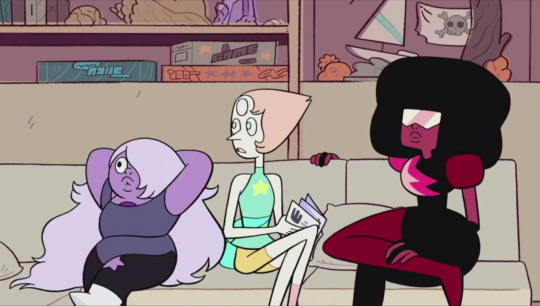
Mayor Dewey and the Crystal Gems are here for comic relief, and oh boy do they deliver. Jo and Abrams are brilliant at giving the Gems incongruous background tasks: in Watermelon Steven it’s reading the paper, and here it seems to be assembling IKEA furniture. Their criticisms of Steven’s art and unwillingness to help his strange problem highlight Shirt Club’s casual tone, and they get little moments of self-parody without dipping too deep into meta humor: Garnet’s twinkling shades during a pregnant pause certainly counts, but Amethyst and Pearl’s escalating concerns about Steven’s shirt problem takes the cake.
Mayor Dewey is incredibly, but not unbelievably, lame. Between his outdated slang and his blatant desire to connect with youths (without putting in any actual effort) it’s easy to see Buck’s disdain. Bill’s speech about losing his speech is overshadowed by Steven setting up his sniping position, but is worth paying attention to for Joel Hodgson’s masterful meandering.
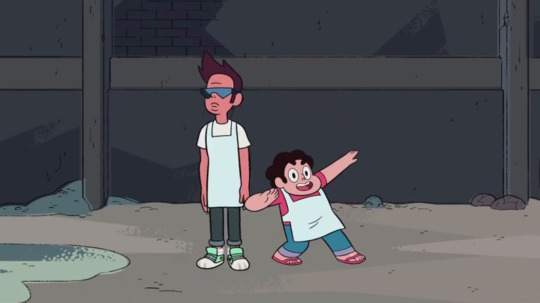
And despite his selfish and thoughtless intentions, actually seeing Buck and Steven making shirts is a bunch of fun. It evokes Steven and Greg’s adventures in rocket science from Space Race, but with the wrinkle of Buck demonstrating actual knowledge of the craft to contrast with Steven’s silliness. While the distribution and interpretation of art once it’s complete makes up the episode’s conflict, the creation process itself is joyful and pure, as it should be for a kid making art.
Buck comes around at the end, of course, apologizing to Steven and offering to take guitar lessons. But honestly, the nicer he is to Steven, the weirder his behavior here seems, whether or not he’s a mysterious guy. The best thing I can say about Abrams/Jo character-nuke episodes is that there’s only three of them, and finishing Shirt Club, from that lens, is a huge sigh of relief.
Future Vision!
The Good Lars not only shows Buck wearing the Guitar Dad shirt, but showing off what he’s learned! And he’ll continue to play guitar as one of Sadie Killer’s Suspects, a band that will eventually be managed by Greg himself.
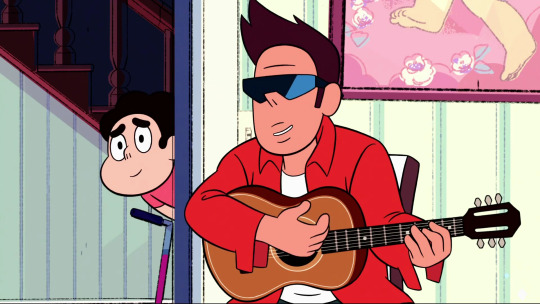
I guess you could read it that way…
On the one hand, watching this after Joy Ride makes Buck’s cruelty even stranger. But on the other, getting to know him better there, and Bill better in Political Power, makes an examination of their relationship a nice coda.
Tonally, Shirt Club simply doesn’t fit where it’s intended to go. Open Book and Story for Steven at least have their dramatic moments that fit the simmering tension of post-Marble Madness Season 1, but Shirt Club’s lightness thoroughly deflates the momentum. The Gems casually building furniture makes no sense in this time period, and Pearl and Amethyst’s list of fears don’t even hint at them worrying about Homeworld.
Still, the reordering leaves us with pre-Jailbreak Garnet, which is a little confusing without context. (I certainly prioritize this minor continuity error lower than harming dramatic tension.)
Regardless of your opinions about the order shift, I’m happy to say that Shirt Club is the last of it! No more asterisks!
We’re the one, we’re the ONE! TWO! THREE! FOUR!
Buck’s strange meanness doesn’t tank Shirt Club down to the bottom, but it does make me less inclined to rewatch what’s an otherwise wonderful episode about art. It’s a shame, but there’s still a lot to love when you get shirt!
Top Fifteen
Steven and the Stevens
Mirror Gem
Lion 3: Straight to Video
Alone Together
The Return
Jailbreak
Rose’s Scabbard
Coach Steven
Giant Woman
Winter Forecast
On the Run
Warp Tour
Maximum Capacity
The Test
Ocean Gem
Love ‘em
Laser Light Cannon
Bubble Buddies
Tiger Millionaire
Lion 2: The Movie
Rose’s Room
An Indirect Kiss
Space Race
Garnet’s Universe
Future Vision
Marble Madness
Political Power
Full Disclosure
Joy Ride
Like ‘em
Gem Glow
Frybo
Arcade Mania
So Many Birthdays
Lars and the Cool Kids
Onion Trade
Steven the Sword Fighter
Beach Party
Monster Buddies
Keep Beach City Weird
Watermelon Steven
The Message
Open Book
Story for Steven
Shirt Club
Enh
Cheeseburger Backpack
Together Breakfast
Cat Fingers
Serious Steven
Steven’s Lion
Joking Victim
Secret Team
Say Uncle
No Thanks!
4. Horror Club
3. Fusion Cuisine
2. House Guest
1. Island Adventure
23 notes
·
View notes
Text
The Mythos That Devours Itself (part 3)
Section II: The Inverted Missingno.
Note: My apologies for the long wait. I had to get a new computer that could handle Tumblr a little better.
There is one additional possible factor in why so many believe Gaster being erased after falling in his creation, despite everything going against it, that I didn't discuss in the last chapter:
The idea that since Undertale deconstructs gaming constructs like the save mechanism, EXP, leveling, and fourth wall observers, then Gaster must be a deconstruction of cut content and The Missingno.
Then again, I left this idea out because, I'm not so sure it's a factor in the creation of the theory or a poorly thought out justification for its existence. There are many things wrong with this concept, starting with an apparent misunderstanding of the definitions of deconstruction, cut content, and The Missingno.
The Missingno. is a game character created by memory error that came into existence by accident and should not exist yet does. Using it can mess up a game by freezing, crashing, or outright corrupting it. It is even claimed to be capable of ruining save files. This is pretty much the complete opposite of what popular Gaster fanon claims Gaster to be.
Gaster is fairly consistently described as someone that should and did exist but was erased from existence in the theory (but not in canon, but that’s a meta for another day). Their take on Gaster is less like a Missingno. and more like an inversion of the concept. The only thing linking Gaster to the Missingno. is that some of the cut content (the actual cut content) involving him closes/crashes the game and the fact that typing in Gaster on the naming screen restarts the game. Problem is, a lot of the cut content that doesn't involve him also crashes/closes the game and the Missingno. is better known for crashing games, not restarting them, though they can freeze up the game and force players to restart manually. The only case where an in-game event involving Gaster crashes the game is the music testing room. The game closes after a message pops up after playing his theme. The message might be from Gaster despite a lack of wingdings -- or, more likely, given what it says, just a message from Toby Fox to the beta testers that he decided to just leave in for some reason or something (I dunno). Not a particularly strong case for a character being the Missingno.
Undertale does contain two bosses that bear some resemblance to the idea of anthropomorphized Missingno.s: Photoshop Flowey and maybe Asriel Dreemurr. Photoshop Flowey isn't stylized to be corrupted the way the amalgamates are, but his powers include deleting the save file, "corrupting" and crashing the game, among other things associated with the Missingno. Asriel is less obvious because it is much more faint and only shown from a storytelling perspective instead of the same dynamic meta angle used for Photoshop Flowey.
In Asriel's case, he erases the monsters' memory of Frisk and essentially corrupts them, and states that every time "Chara" dies they are forgotten a little more. This doesn't actually affect the game files any, but -- since nothing indicates that the monsters' memories of Frisk fade with each death during the rest of the game -- it can be taken as a kind of data corruption caused directly by Asriel, who shouldn't even exist, as he died long ago. Since he is breaking the laws of reality just by existing, an argument can be made that this makes him (and naturally by extension Flowey) a full-fledged Missingno. character.
Characters with corrupted data aren't a new concept in Undertale in general. The amalgamates are, from a meta perspective, jumbles of corrupted data mashed together that create visual and textual glitches. The only reason I wouldn't consider them Missingno.s is the fact that this is the only thing they have in common with Missingno.s. Yes, even taking Memoryhead into consideration. An argument can even be made that Undyne is a glitched character that weaponizes her own innate data corruption to be stronger and longer lasting than the game would normally allow at the cost of causing her body to break down in the end. This is the other hole in the reasoning that Gaster is a spoiler because he's a deconstruction of cut content/The Missingno. The game has no problem with doing deconstruction correctly or openly depicting characters that are glitched in some way or even essentially the Missingno. So why? Why treat Gaster as if it's a deep secret meant to be handled by top men (insert obligatory Raiders of the Lost Ark clip here)?
Needless to say, this explanation makes no sense. It makes even less sense when we consider the meaning of deconstruction. In regards to story writing, the most basic definition of the term deconstruction is to "take apart" a common plot element or character archetype by applying real world logic to it and showing what would happen. A deconstruction is supposed to shed fresh light on a concept and make the audience think about a subject that they might otherwise overlook. They teach the audience something about themselves and the world around them, while letting writers approach a potentially overused idea from a fresh and informative angle. While some stories attempt to deconstruct several things with no connection, it tends to be more effective when a story focuses on one deconstruction theme.
All of the elements deconstructed by Undertale relate to the player, things like stats and game saving, and player/character relations. Take for instance, Sans, who deconstructs the concept of the medium aware fourth wall observer, the character who is aware on some level of being a fictional character and of the existence of a player/audience. This type of character tends to take this all in stride. They are also frequently depicted as being capable of seeing the fourth wall because they are insane, sometimes dangerously so (e.g., The Joker according to some DC writers), which leads to the mindscrew question of whether or not they are really aware or suffering from psychosis that makes them believe they are a fictional character in a story (basically, a form of dramatic irony because the audience knows they are a fictional character, but the character only believes this because they are completely mad).
Instead of taking "it's a game, I'm a game character, and you're the player" in stride or being insane, Sans doesn't even come close to reaching the conclusion that he's in a game, because that wouldn't be a logical conclusion to finding out that some godlike being of unbelievable power is messing with the timeline, erasing everyone's memory at a whim, and toying with their lives, and the revelation is implied to have broken him somewhat. To underline the point that his medium awareness is real and not a case of insanity invoked dramatic irony, he discovered this as the result of scientific research into something monsterkind was not meant to know.
This is a good example of a deconstruction, because we know how medium awareness usually works, but once realism is applied, it becomes like something out of a cosmic horror story. Except better because Sans is also a realistic take on the concept of being driven mad from the revelation, which is pretty much a staple of cosmic horror (even though this usually took the form of scientists having the weird habit of fainting in terror when faced with something that should from a logical standpoint make them foam at the mouth with excitement).
The biggest problem with the idea of fanon Gaster being a deconstruction is that what Undertale's deconstruction themes don't have a connection to is the developers and game development process. There are good stories about the relationship between artists and writers and their creations, but Undertale isn't one of them. This should've been apparent to everyone playing the game.
I remind you, Toby Fox has a "shitty dog" with a silly little leitmotif for an in-game author avatar that is said to have "accidentally programmed a game by barking into a machine" and is involved in all kinds of hilarious and random high jinx throughout the game. A spooky "deconstruction" of cut content would be thematically out of place and the idea isn't explored at all. Not from the developer/creation perspective nor from the perspective of the cast. A few jokes are made about how cheap and lazy the creators of the game are, but they are all lighthearted little quips. There isn't a single serious jab at the developers.
It's not even technically possible to deconstruct cut content, dummied out characters, and Missingno.s in this way because they aren't characters or even story elements in and of themselves. As a rule of thumb when it comes to writing deconstruction, you can deconstruct story concepts, plot elements, and character archetypes, but you can't deconstruct objects, concrete or abstract. Cut content, dummied out characters, and Missingno.s are objects. What people are probably thinking of is anthropomorphism and a story that explores how cut content would be perceived by the characters of the game and how they would think and act if they were alive and had awareness. This is an idea that has been done before to great affect. Atop the Fourth Wall has done it. Homestuck has done it. Hell, Undertale has done it, as explained above. Atop the Fourth Wall and Homestuck both contain a sapient major villain that is essentially The Missingno. and their affect on the world around them is much like how a Missingno. affects games, erasing people and things from existence and corrupting reality itself. Homestuck didn't really explore the character from this angle all that deeply and the villain never sees themselves as being The Missingno., but Atop The Fourth Wall characterized its resident Missingno. as desiring to absorb all existence so it will become all rather than nothing.
So this kind of plot is very much doable, but to pull it off in a way people can appreciate the story, you would have to do much, much better than just hinting in the most cryptic and logic defying ways possible.
I think one could theoretically build a game that utilizes the game files themselves to tell a story, even the main plot of a game, with some clever game writing programming where even the least code savvy gamer is provided an easy way to hack into the plot-significant "cut content" files by the actual game with the developer's blessing. The special game file content can even treat the game files like the player character's dream world, or the afterlife where the player character can encounter and talk to characters that they've killed (in the case of a game like Undertale, all versions of this room except one would be rendered 'unreadable' at the end of a run) or characters who have died in the past with obvious comments on how the player shouldn't be there.
Another idea is to depict the world presented in the special game file bits as the existence before life where the "dummied out" characters that never got the chance resent the working NPCs and manage to escape into life/reality to become the game's primary villains in the "actual" game.
There are so many ways cut content and game files can be potentially used to tell a coherent story, but that is not at all what I'm seeing with this widely accepted interpretation of Gaster.
More information on The Missingno. can be found here on Wikipedia, which explains the term's origins more fully, and here on TV Tropes, which explains the concept in its story trope form (please don't get lost in there!)
#my meta#utbarebones#undertale#undertale theory#gaster theory#gaster meta#critical fan analysis#reposted from ao3#fannish thoughts#fandom.exe
5 notes
·
View notes
Text
Ani-Me #13: Groovin’ To That COWBOY BEBOP (Ep. 1-13)
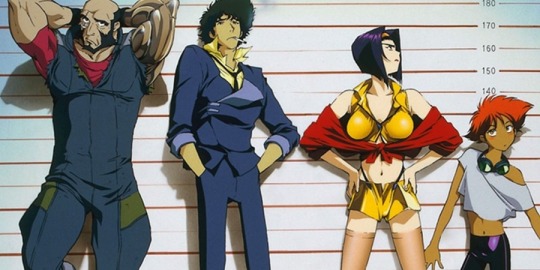
Welcome to Ani-Me! The Series Where You Make Me Watch Anime! To be clear, you aren’t making me do anything because I have enjoyed every bit of this so far.
And surprise, nerds! Look what I’m doing! Haha, I actually had this whole fun plan to do the anime poll and then Ozymandias-style be like “I already WATCHED THE WHOLE SHOW!!!” But it would take too long to finish watching all of it (it’s been a busy as hell month). Besides, I got half way through the show and decided that was definitely enough space to really dig into how I was feeling about the start. So without further ado, it’s time for…
Today’s Entry: COWBOY BEBOP (1998-1999)
So, I’m doing this because I felt like I needed to have reckoning with this show.
That’s because I actually tried watching it once before. This was about 10 years ago. An old friend thought it was positively insane that I had never seen it before. He wasn’t the first to sing its praises either. Even at the time I was open to the idea and gave it the old college try for a bunch of episodes, but… it didn’t take. I think I was mostly crashing up against the proverbial rocks of all those tangible details I was not prepared for. Which were really just the kinds of things that had kept me out of anime for so long. Like the facial contortions being so different from western animation. Or the way this particular story seemed to fixate on cool posturing in a way that likely would have more appealed to me during my teenage years. Heck, I was even wondering why there was a romantic, emotional pop song at the end (again, I had REALLY not seen a lot of anime). Then there was that very complicated issue of “fan service,” because I was watching with someone who was like WHY ARE HER BOOBS ALL OVER THE FUCKING PLACE!?!?! Simply put: they were really not having it. Plus the fact that we were watching the dubbed version, which felt like it played into a number of sexist tropes. So much of this was the problem with my initial experience.
But I imagine anime fans are so fucking tired of these kinds of complaints from outsiders, no? Hell, even just a year into this column series, I’m tired of them, too. But here’s the thing: these complaints are the common obstacles for outsiders and some are not without merit. And as much the casual dismissal from outsiders about anime can rankle, it’s also important to remember how it is for the outsiders - to realize how much of that anime-fan tiredness manifests online in the forms of equally-casual dismissals (mostly from toxic white dudes) for “not getting fan service,” etc. Point is, misunderstanding and excuse-making can go in a lot of directions. And honestly it was all part of the system of why I think I stayed away from anime for so long?
Thankfully, everything’s about timing.
So much of this column series has been about throwing myself in the deep end, getting used to the cinematic language, knowing the filmmakers, and growing comfortable with the cadence of a particular form. But honestly, I think so much of it has to do with just being much older, too. Basically, I calmed the fuck down. The previous things that bothered me are still there, but it just feels like so much less of a big deal. Even “the rules” of what I tend to believe about storytelling are so much more expansive. As they say, finally “I’m not young enough to think I know everything.” Along with that, there’s the popular online joke that something “hits different,” but coming back to Cowboy Bebop after a decade… it hits different. Like I said, timing is everything. Which brings us to another reason I really wanted to do this now…
So John Cho goes to my grocery store a lot.
A little while ago I saw him in full Spike hair and it was rad as hell.
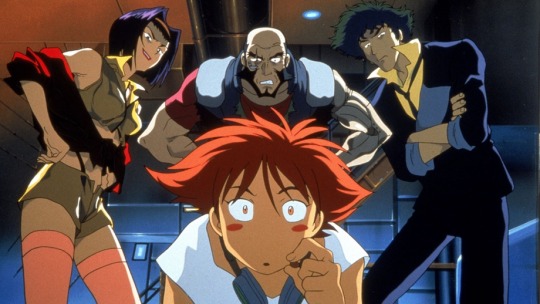
So I’ve also been thinking a lot (read: too much) about how to cover Anime TV. Ideally, I like the idea of doing one giant essay about a series, but sometimes 1) overall thoughts don’t take on essay-like form the way they did with, say, Evangelion. And 2) that sometimes takes out the fun of talking about little things in each episode. But at the same time, I don’t want to feel the need to do the FULL RECAP thing with every episode, which sometimes bogs down the more important thoughts / gets repetitive (I felt like I ended up doing that with a lot of Korra recaps). So really, it’s going to be a case by case basis. And for Cowboy Bebop, I decided on a sort of “fly casual” approach with no plot recapping - just the evolution of my thoughts along with some other random passing ones. And it will all likely crest into big overall thoughts that will come with the end of the series.
Cool? Cool.
1. ASTEROID BLUES
“Oh, this is good, isn’t it?”
I said this to myself while watching and I simply cannot explain the difference the subs make for me personally when it comes to this show. Like I know the dub has a lot of fans and history, but everything about hearing the show in Japanese just plays stronger to me. The rhythm, the cadence, and most of all the timing of jokes. There’s just this way each of their voices better line up with the droll affectation of the show. Combine that with me finally being used to a lot of anime’s particularly cinematic language? The show just plays so FUNNY now. Like I’m laughing out loud four times an episode. But that’s not the only thing that’s changed.
When I tried watching a decade ago, there was also this funny thing where I was having a very different relationship to the cinematic affectations of the late 90’s. Like how much of this episode reflects the El Mariachi / Desperado machismo that defined a certain kind of posturing coolness. Back then I worried a lot about that specific brand of indulgence. But now it all feels so silly and playful (as if, at the time, I wasn’t so much reacting to the worry of that coolness as how much the me of TWO decades would have eaten it up). Like I was the perfect age when this show came out the first time.
But I think that’s the real thing that hits me now with the episode: how playful it all feels. Like the absurd shot of the woman leaning on the counter to drink beer, the cat drinking all the crap on the ground, the sole motive of wanting beef, and Spike fitting a whole sandwich in his mouth. It takes none of these things seriously - except when it takes them seriously, of course. The episode’s structure is really built around the two bait and switches. The first is the fun fake pregnancy where it turns out that’s where she keeps the vials. And the second - tragic, with her death. Fast. Brutal. Forlorn. From minute one it’s sort of spelling out the tonal nature of this show: the fast loose hijinks > serious comeuppance > the Sisyphean process of bounty hunting without success… But hey, at least they got that beef.
It’s an apt metaphor.
2. STRAY DOG STRUT
In my original go round, I remember this being the episode liking this enough to stick with it longer. But now it plays even better. It’s kind of a classic fun and games episode, with the great set-up for the dog reveal - and the classic “lose but kinda win” ending a la Santa’s Little Helper (along with the dramatic irony that the dog is worth millions). I think I actually referenced this two columns ago, but there’s this kind of “kafka-esque’’ funny edge to the show. That “there is hope, but not for us” sentiment that populates a show of lovable losers trying and failing to navigate life’s absurdity.
But what I also like is that it’s not from a complete lack of competence. The gag where they both look up from the aquarium and Spike’s already got the gun drawn? That’s perfect stuff. Same goes with Spike absent-mindedly missing Abdul because he has shit on his foot. Both help establish this incredibly enduring character that thrives on both confidence and a genuine lack of awareness (which is often how he is able to pull a fast one on the audience, too).
The episode also helps clarify the show’s setting of an American Cultural Diaspora, filtered through the lens of Japanese culture. Could the Abdul stuff read as problematic? Oh absolutely, but the Game of Death / Way of the Dragon reference is also so singular to Kareem Abdul Jabbar’s influence that I’m not sure how much intention exists from the creators outside of it. And for an episode that delivers hijinks like Spike stealing the “just married” car and the incredible sound cue / animation of the corgi slapping onto the hood of his ship… I can’t help but smile.
3. HONKY TONK WOMAN
Ahhhhhh Faye Valentine. It’s funny, I wont say that I’m “used” to fan service at this point, nor really have any interest in excusing its extreme nature… I’m just sort of not letting it stop me from engaging everything around it? Does that make sense? But once again, I can’t explain just how much original language helps her character specifically. Megumi Hayashibara has this kind of wonderfully bored, disinterested tone that fits the characterization better.
The other thing that really hit with this episode was the James Bond-ness of the series (I mean in this gambling-centric episode drrr). But it’s the riff on the silhouettes in the opening titles, the pastiche of cool, and again, I keep coming back to that late 90’s disaffection that falls in line with Bond’s unruffled ethos. To wit, there’s a reason young men like disaffected characters, of course. In that it’s just as much of a power fantasy as so many other things are. They have all these budding, confused emotions and life feels so uncontrollable, so it becomes easy to grasp onto characters who play it cool, who show suaveness and are unbothered by the ups and downs going around them. Of course they want to be like that.
Which would normally be a possible “indulgence problem” if this show wasn’t also so keen on taking the piss out of Spike and company. That’s the thing: it’s just so damn playful at the same time. Unlike something Bond-esque, it’s always looking to make Spike the punchline. And the twisty, confusion-laden plots of chip-swapping and rubes and one one-ups-man-ship? I cackled constantly. And I have to say the fight in this one is so, so good. And the last line?
“Bye” … chef’s kiss… is… is that thing the kids still say?
insert grandpa face
4. GATEWAY SHUFFLE
It’s probably weird that THIS is the thing that most stands out to me, but it’s weird how much Twinkle reminds me of “Mom” from Futurama, right down to her large adult sons. I also like how much the episode plays with the dramatic irony of Spike and company being totally oblivious idiots (which will be a running gag), especially them on the verge of killing themselves with the virus. Also also, it establishes the sheer volume of problems that Spike fixes with sleight of hand. Also also also, there’s the fact that this episode is where Faye joins the team for good, thus setting up the fun larger team dynamics.
Is it weird that I don’t have much more to say about this one? It sort of reflects the way some Bebop episodes just feel slight in a way, which isn’t to say they aren’t fun or don’t have good gags. It’s just sort of the nature of this show, sometimes. Cause you’ll get an episode like this and then the next time you’ll get… Well, you’ll get an episode like…
5. BALLAD OF FALLEN ANGELS
“Who is this Sephriroth mother fucker?!?!?”
Such is the way I noted the entrance of Vicious. Given the overlapping timeline, I’m guessing there was something about long gray haired evil dudes with big swords in the water? Either way, the far more obvious influence on this one is John Woo. There’s the gunplay. The cathedral. The operatic posturing. It all brings me back to a place and time so vividly. That place and time being a teenager in the 90’s with a camcorder, boy, I can’t tell you how often we ran around with toy pistols diving off to the side and putting it in slow motion (we could never seem to find doves, but were always on the hunt for a group of pigeons to run through). This instinct also highlights the potential problems with these tropes. It would be SO easy for this to be nothing more than juvenile posturing / copying an en vogue aesthetic, but - as I’m learning is common for this show - Cowboy Bebop kind of hits this different note entirely…
Mostly thanks to the score. Because it all comes back to that ending with the haunting chorus of Green Bird, which gives me an array of complex feelings (along with it being a song I’ve had in my head for weeks now). On a pure aesthetic level, the scene is perfect. The pure combination of image, sound, and symbolism to hit an emotional response so squarely. A decade ago I felt this moment was more about hiding the story in a way - as if teasing backstory instead of even showing it - which isn’t entirely wrong, but now it feels more economical than anything, merely touching a lot I can have patience that will be dealt with . And more important than the specifics is understanding what it means to Spike emotionally - how much Vicious is part of his life and lost love and injury and pain, the cycles of opera and birth death rebirth death that all fit the same lyrics to the song…
“Spring has come
Worms are showing their faces
Little birds are eating them
Spring has come
Children are going to school
Farm dogs are giving birth to puppies
Spring has come
Women are looking in mirrors
Egg pies are baking”
In short, I understand why it’s a classic.
6. SYMPATHY FOR THE DEVIL
It’s here I realize that writing about Cowboy Bebop is a bit counter to my general instincts. For I’m someone who likes digging into problems because it helps me understand things. With Korra or Falcon and The Winter Solider or something, I can stop, dig into the structural problems of a given episode, talk about approach, and feel like everyone was coming out the other side with a bigger understanding. I get that sense of purpose. But what’s odd about this show is everything is incredibly sound on the writing front. Every weekly “session” gives us a contained, thoughtful, playful little story with little differing nuances (it actually reminds me a lot of the Lone Wolf and Cub story structure, which yes, I’ve read all of by the way). And it’s no different with this episode (which also reminded me a bit of the ventriloquist dummy episode of Buffy?). There’s even so many really great things that stand out. Like this is the first episode where Faye really clicked for me (the gag where she casually eats the dog food is an all-timer). I also loved the kid getting Last Crusade-ed at the end.
But the “what makes us care” is a whole other ball of wax. Because this was the last episode I watched in my initial trial a decade ago. There wasn’t any big reason I stopped, just that simple lack of interest. And I think it speaks to the trouble of telling stories about disaffected characters. The whole idea is that they’re often hiding pain or interest or backstory or whatever else. Then the idea is you’re slowly supposed to peer in (and I’m far enough into the show to know how they do that). But if you’re not really all in on a character’s emotional journey from those critical starts? Sometimes it’s hard to work up that investment. If I was watching this as a teenager in the 90’s? I would likely have a whole different feeling because I’m watching in more of an aspirational sense. But watching an episode like this, from where I am now? I understand why it’s easy to feel a lack of connection, even when the boy is giving all the tears about the release of death… It feels like an emotion on display, a thing I’m looking at, but kept a distance from - and thus a harder thing to certainly feel.
7. HEAVY METAL QUEEN
For shits and giggles I watched this one with dub. It’s interesting because it instantly reminded me that part of the reason I like subs so much is it needs your undivided attention. With the dub? Suddenly my eyes could wander, sometimes to twitter sometimes and then I’d realize I missed something and rewind a second. In that capacity the subs are actually allowing for more distraction? Which is why 1) I worry that most shows seem designed to be watched with someone half paying attention and 2) I tend to watch things sans phone as much as possible. Look, it’s not that this multitasking activity is “bad” inherently. I love listening to podcasts as I cook or clean. It’s just with cinema it’s so easy to do and miss out on what I really want to be doing. Which is being enveloped in a story.
Anyway, I’m more or less good with this episode. I wish I had more to say than that. But once again I feel like I’m coming out of an episode with an “okay, that was solid” feeling. Perhaps because also plays into 90’s dated-ness in a way where all the things that should feel modern feel just so… heteronormative? I dunno. It’s like VT feels like a character I should be adoring, but with 20 years she feels like a half-measure. And even at the time, it’s really hard to get past the dude in the sombrero ogling the waitress who looks like lady liberty. Like, the gross metaphor is utterly clear, and not in a way where it’s countering it on any level. But there’s always those moments of elation, like Spike firing his space gun to better direct himself back - that make the show still feel special.
8. WALTZ FOR VENUS
So this is the first episode I unequivocally loved.
Perhaps it’s just because it does some of my absolute favorite writing things. Like, hurray! They finally got paid! But true to understanding their ethos, it happens almost immediately in the opening, thus setting up proper expectations for what is to follow. And then it does my absolutely favorite thing, which is make you absolutely care for a character you hate without realizing that’s what it’s doing. Roco at first comes off as annoying, jealous, brash, etc. But with time and perspective, the eagerness ends up being motivated. And the way it all crests into him using the “like water” teachings of Spike’s supernatural reflexes? Perfect moment!
And then he gets fucking shot.
I literally screamed NO in my living room. But that’s what good writing does, it takes you through journeys subtlety then knocks you on your ass with whiplashing emotion (I also realized this entire beat, right down to the thumbs up in the middle, happens in Mad Max: Fury Road). And what’s more is that even on death’s door stop, all his eagerness and wonder could be summed up in that youthful question: “Hey, if I knew you earlier, would we have been friends?” Gah, it’s just gutting. And so absolutely perfect in its dramatic articulation.
With this kind of competent writing on the “fun / plot” level, it’s also funny how much I remember the little details that the show is so good at. Like the use of the Hagia Sophia on Venus. Or the way the rich guy shouts to save himself and then gets his toupee knocked off.
… And then there’s those super gay panic 90’s details like shoving the gun in gay man’s throat that make my skin fucking crawl. As good as things can be, those ugly shadows loom large.
9. JAMMING WITH EDWARD
I love that they finally get around to explaining why earth sucks and everyone is in space in episode 9! This is also one of those episodes where the cyberpunky-ness of a rogue A.I. would play more fresh back in the late 90’s? By now it’s just hard to grab onto, given how many times we’ve seen this plot done again and again. But thankfully, the show has the complete dignity to continue its tradition of being playful instead of serious, in that MPU is a little freaking weirdo whom I am glad escapes.
I sort of don’t know what to make of Ed yet? I like certain affectations and weirdness, but I’m hoping it crests into something interesting. Otherwise, most of my notes cater around very specific reactions to moments. Like how Nazca lines were just in my trivia league! Or how the episode had huge Android: Netrunner vibes! Also a Summer Wars-like internet world! And great quotes like “there’s nothing made on earth that’s good” and paying it off with the cheap missile firing a dud.
But I also just want to mention lines like, “I hear that that hacker is gay hahaha” which I want to come back to because I don’t think is just a “Japanese culture” thing. That’s a “90’s gay panic” thing. And what’s important to talk about with these moments is that I don’t handwave them now as being dated and in the past. Because they weren’t “the past” for me. They were what I lived in. And revisiting it all from where I am now makes me FURIOUS. That’s because they were all part of a gay panic culture of the 90’s than gave me so many internal complexes and fears about being bisexual (I didn’t understand that’s what I was, really, I was mostly terrified I was gay and thought it would literally get me killed) and bunch of other stuff. It was just brutal. And I spent that entire decade around all this kind of media being like “hahahhahaha no big deal, right guys?” and I didn’t realize inside it was just tearing me apart - in the worst sense of making me deeply afraid in myself. It wasn’t the past, it was hell.
Anyway!
10. GANYMEDE ELEGY
I was wondering when we’d get to a Jet episode. So far he’s been the kind of character I don’t know much to make of. He mostly exists to be a no-nonsense foil to Spike’s irreverence. But even in this episode, a lot of his gruffness comes off as harmless, but then there’s the “be strong for her” ggRrrRRrrr pRoTeCt wOmAn philosophy just rubs me the wrong way. Though I think there’s a lot of valid reasons people gravitate toward characters like Jet? Even if I hesitate to get all pop-psych with it, I think characters like this remind a lot of people of their dads? I dunno, more curious what others think.
But Jet’s backstory completely fits it with what I’m now calling the C.B.M.O. (Cowboy Bebop Modus Operandi) in that it presents a forlorn, almost classical noir backstory - doesn’t go too deep with it, leans heavy on the pastiche, but at least has the dignity to be fun in the process. And by the time we get to the ending, the final confrontation with Alisa and Rhint still plays emotionally valid, which I think is all you need in this show (including strong thematic gestures of literally throwing the watch AKA your past into the ocean).
But also once again, what’s more burned into my mind is little moments and decisions. It’s trying to light the lighter with the bad memory cooked up in your head. It’s underlining the dramatic irony of tragedy with cutting lines like “this must be because i have good karma.” Also that end song totally sounded a lot like Seal’s “Kiss From A Rose.” Also we got gem lines like…
“I live and wander with a group of weirdos now”
I do, too… I do, too.
11. TOYS IN THE ATTIC
Let’s get right to the plum gag: bahahahahahhahahah the alien being an advanced form of leaving lobster in the fridge is just SO AMAZING. I was cackling like mad.
And honestly, I think the lead up with the entire episode was pretty damn great. It just has a completely different energy, not just in regards to playing with the sci-fi / horror tropes (which it’s not laying it on thick or anything), it’s just this fun verve. You feel it in the energy of how everyone hangs out. Like Faye completely taking Jet for all he’s worth in the strip poker game and his “honorable” reaction (this side of Jet’s gruffness I like a lot more). Which all just serves as the perfect dramatic irony of the encroaching, otherworldly horror. It also sideswipes these great little lines about how humans “quickly forgot the lessons they just learned.” And once again we get an episode where all the highs are in the little details, like the little beat where the alien good wiggles again before it’s fully melted. Even the episode’s overlaid vignette structure about lessons (which could be trite when applied in gauche fashion) instead only exists as a distracting bit of artifice that is only really leading to a sublime gag: “You shouldn’t leave things in the fridge… that is the lesson.”
Five stars. Would rent again.
12.-13. JUPITER JAZZ - PART 1 AND PART 2
I feel like it makes sense to write about these two episodes as a single entity.
First off, I have to say how much I like the pacing of them. Most of the sessions of Cowboy Bebop are lean, mean, and economical, which is all part of the fun. But even though the show has its moments of rest / down time,” it’s often rushing through conflict and rarely milking the drama in a way that lets you sit with the tension. Which just means I rarely feel like we ever have a real chance to just dig into a longer story pace. Which is of course what we finally get in this mid-point two part epic that brings us back to Vicious. Which, of course, we all suspected would happen (I say this like we’re all watching the show live for the first time, haha). But now that we’re finally getting into the story itself…
I’m not sure how crazy I am about it? Like, it’s all coming back to that problem of “how much do I really care about all these characters?” I like them and stuff. Really, I do. And it’s really nice to get moments of genuine emotion, like when Spike gets legitimately angry at being called Vicious. But there’s just this thing where I can’t get the emotional investment in the show to really drive that constant want of engagement. There’s fallibility, but so little genuine vulnerability. So it’s not really the kind of show you “lean into.” Which is all part of the ongoing cool disaffection. But hey, isn’t that just how noir operates?
The thing most people don’t understand about noir is that all that disaffection and hidden emotion always bubbles up by the story’s end, often in the spectacular ways of coming undone. Like, the vulnerability explodes by the end. But with a TV show slowly dolling that out like four times across 26 hours? Yeah, that’s not what the noir structure was built for so it just makes it harder to engage. Particularly when characters like Vicious still feel like cyphers in a way. Same goes for the way Julia feels like that haunting ghost. Like we learned “more” about them, but I don’t feel “closer” if that makes sense.
And it also doesn’t help matters that these episodes do some of my least favorite story tropes. Like when a female character is like, “I’m a girl who can take care of myself!” which seems to position them as not being the damsel, but then the male character saves them anyway, which just makes them EXTRA good at rescuing the kind of super-capable women who think they’re above damsel-ing! The fact it does so on the sly that feels even ickier than that. Same goes for yet more homophobia in the episode. And speaking of LGBT+ treatment…
I have NO idea what the heck to think of Gren? Like did they really say that Gren just got a hormonal imbalance from insomnia from going to prison??? Wut??? I don’t want to google things until I’m done with the show but needless to say I’ll be reading from trans / non-binary writers on the subject because I’m having huge flashbacks to The Crying Game discourse that so radically shaped more 90’s-ness when it comes to this stuff. Speaking of which, of course the character dies. And it’s amazing how many people don’t even recognize the problems of this trope, or even that it IS a trope. The reason the “kill your gays” trope exists is because it’s always written by straight people trying to grab other straight people’s sympathy (look, see now you care about this character because they died and that’s sad!) Meanwhile it only teaches LBGT+ people that they are doomed and should be afraid and that their “sacrifice” only exists to teach the straights lessons or whatever. Again, we’re just back in 90’s tropes that I internalized and have come to resent in much more meaningful fashion.
And yet, despite all the things that stick in my craw, this show always has these little things that seep right into my brain and stay there. Like that moment where Lin dies and Vicious clarifies, “he protected the rules,” which is just a forehead-slapper of a perfect line. And then the last little variation on the end title that really hits you: “Do you have a comrade?” Oof. These little things are what makes me ultimately care about the show. It’s not the drama. It’s the little ingenious moments that stick in there and keep rattling around in my brain.
Speaking of brain rattles, this also finally brings us to why I also felt comfortable stopping halfway through the show to write all this down… The other night I felt inclined to start listening to the soundtrack and it was all just there in my brain already, set in stone.
Point being, I’m in.
<3HULK
0 notes
Note
lucifer musical au
oooh okay. so like MUSICAL musical and not musical episode.
1. Lucifer starts the musical off, it’s a jazzy sort of sound. It’s called something silly like The Devil in Me and has a ridiculous amount of puns and innuendos and it serves to introduce himself, Maze and Lux. It comes to a screeching halt when Chloe enters the scene. (Like Lucifer seeing Chloe in the au ep)
2. Chloe doesn’t sing in most of Act 1, a lot of her lines are spoken with the exception of a cute little song she sings with Trixie until she and Lucifer share a duet This Is Real. (and they share a kiss afterwards)
3. Act II introduces Marcus who tries to sway Chloe, singing a ballad He’s Not What You Think (ah irony). It works momentarily and Lucifer sings a very sad and sweeping version of his intro song The Devil In Me (reprise) except its full of tragedy, lots of wordplay based off the first one, but making it terribly sad. (a little bit of a poto vibe)
4. Lucifer tries to convince Chloe that Marcus is a villain, perhaps his own style of He’s Not What You Think.
5. Chloe gets to have her own big musical song, What Do I Deserve? where she contemplates the two men in her life. (and reaches a decision)
6. There’s a dramatic Devil Face Reveal (of course) and some really intense music. Maybe a fight between Marcus and Lucifer like Gaston and Beast.
7. Lucifer tries to hide his face, but it’s too late, she’s seen him for who he really is. There’s a brief reprise of What Do I Deserve? and then she kisses him, Devil Face and all.
8. Together they sing This Is Real (reprise) and they’re both teary eyed and in love. The curtain falls on them, in each other’s arms, Lucifer dipping down for another kiss.
107 notes
·
View notes